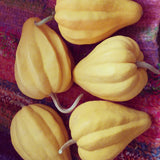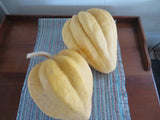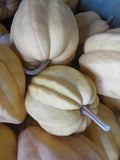Quick Facts
-
*Short Season ALERT* Matures quickly
- Heirloom
- Stores very well
- Productive
Cucurbita pepo
80-90 days. This unusual tan acorn squash is totally under-rated! Vines bear abundantly and all fruits mature in 90 days or less, perfect for our short season climate. Flesh is tan and like the name suggests, smooth, sweet, complex, and even chestnut-like. So flavorful, we like to steam it and eat it plain! Originally from Thelma Sanders of Kirksville, Missouri, the seed was given from Evert Pettit to Sue and Tom Knoche, Ohio squash collectors. Thelma described this good keeper as ‘better than sweet potatoes.’
How to grow it:
|
Germ Temp |
Indoor Start |
Germ Days |
Frost Tolerant |
Sun |
Seed Depth |
Plant/Row Spacing |
|
65-95 |
3 w. |
3-13 d. |
No |
Full |
1/2” |
24”/48” |
|
Plant 1-2" deep in small mounds 24" apart. Winter squash are heavy feeders so provide fertility initially, then every few weeks through the season. Harvest before the first frost, as even a slight frost will damage the flesh and make the squash unstorable. Allow to cure in a sunny, frost free location for 2-3 weeks. This curing process seals the pores of the squash skin for storage and improves flavor. Learn more about growing, harvesting, and curing squash in our blog post about it! |
Seed specs: 3 g., ~45 seeds
Slow Food ARK OF TASTE Variety:
For it's rich history and cultural significance, this tomato has been chosen to board the Slow Food Ark of Taste. The Slow Food Ark of Taste is where "culinary heritage meets biodiversity." Varieties placed on the "ark" are those whose rich history and cultural significance is well documented, yet whose existence is threatened simply by the lack of people growing and perpetuating it. Varieties of crops, like species of plants and animals, can (and do) go extinct from lack of habitat and unfavorable conditions. These varieties deserve preservation not just because they each have a great story, but because the futures of our evolving food crops depend on a rich well of genetic diversity with which they can continually adapt, and be adapted by plant breeders, to thrive in changing conditions. In the case of our food crops, the unfavorable conditions leading to a decrease in diversity are many, but one we can immediately address is the decrease in the number of people growing these crops and saving these seeds.
A small kitchen garden really can change the world!
Check out our Slow Food Ark of Taste Package.






